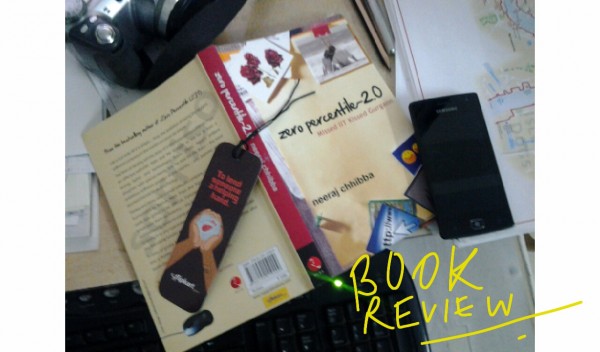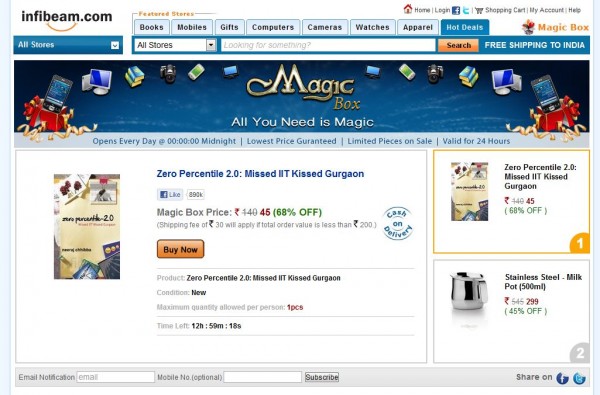Let me begin by three quotes from the book:
Quote 1
‘Salem was a frightful dog waiting to be unleashed and the lady, a financial wizkid. One was a doer, the other a thinker.’
Quote 2
‘It was heady. But this will be the only time,’ Nitin pushed her away, not knowing whether what they were doing was right.’
‘I want to go all the way,’ Tanya was adamant.
Quote 3
‘Certain moments come very rarely and fleetingly. If you catch onto them they may have the power to change your destiny but if they pass, you rue them for all the great possibilities they held, yearning to have that moment back again for the rest of your lives.’
The first quote gives you an instinctive feeling that the novel goes deep into the murky world of business and dissects it well to reveal some intrinsic truths for you. Or maybe it dives deep into intrigue and comes up with some thrilling gems from the fermenting realm of corporate life. Neeraj Chhibba never thought of this aspect as the wholesome formula for his novel and gives us these racy moments of intrigues only towards the end. The teaser and the tech puzzles that one comes across after almost 200 pages of something else doesn’t feel so good. There are some brilliant touches here and there, particularly when Salem makes his entry with his heart-pounding tagline: ‘If you love you need to be a little evil. Good deeds will give you moksha. Evilness will make god give you a second chance at life.’ Such thrilling moments, unfortunately, are few and far between.
The second quote impulsively makes one think that there is a lot of steamy action in the novel. Nah! It is not there. Despite the alluring Priya and the dulcet Jaanvee, the pages sadly do not ooze with any sensual content. Unless, some reader wants Nitin’s proposal to use two condoms as something that is arousing and full of sex. The author has no incident, no dialogue that brings him anywhere near Vladimir Nabokov’s Lolita… and not even anywhere near the kind of sensual content one read in ’11 minutes’ by Paulo Coelho.
The third quote raised in the urge to maybe classify this work as something that meanders into the abstractions of relationships, demystifying the intricacies of emotions… but it simply takes you and throws you into some garbage pit of mundane life descriptions and goes on to garnish all this with insipid and jerky dialogue that appears quite unreal and sometimes unfathomable.
So, if the novel is neither of the three types as mentioned above, what is it really? Let me quote the author himself from a blog post that he had written on November 8, 2009 titled ‘A storyteller is hidden inside all of us’: ‘A friend once told me that there is one good story hidden inside everyone. I am not surprised with this observation. All of us lead a life which has one or the other thing which is unique to us as an individual, as a community or as a nation. Someone is a brilliant achiever, someone else is the perpetual king of pain who courts tragedy all the time. There are many who have lived forever stricken with poverty. I know people whose life took a complete U-turn after they unexpectedly lost their young and healthy near and dear ones.’
The story is certainly good and makes you want to know what happened next though without one having gained much through reading it. That is, this novel actually is just a story without the magic of Dicken’s narrative, McEvan’s incisive analysis, or Hemingway’s simplicity disguising all the complex things life can ever offer!
The novel does have its good moments though:
Smooth character introduction.
There are no obfuscating and frustrating moments making a reader struggle with getting over the initial pages trying to understand the what and who and why and how of everything. The plot comes easily, the characters introduce themselves clearly, though limping a bit, and the story does chug forward though the author makes you hop, skip, and jump from one set of people to another.
Easy connect between the multiple lives that feature.
Yes, whether it is the Arjun-Muskaan-Diyaa tear-jerkers, the Jaanvee-San fiery-grilled combo or the Pankaj-Motu-Priya long-term romance stuff, the novel tends to keep the issues clearly demarked and doesn’t allow them to mix and mingle to confuse the reader. This, however, isn’t such a good idea, I feel, as the author did have a ready-made plot where he could have experimented a little more but neeraj chose to stay straight with the plot.
Issues taken up without making them seem like publicity.
There is the issue of AIDS picked up by the author and he does go about telling the readers a lot about it without resorting to too much sarkari lecturing and sitting on text-book kind of explanations. He does it with character development, weaving incidents and emotions rather thoughtfully.
The author also tackles the word ‘handicapped’ with a fair degree of sensitivity. Look at this conversation and you’ll know why:
‘She is handicapped and not normal. Can’t you see?’
‘I think she it is you who can’t see. She is not handicapped. She only has a disability and she has tried really hard over the years to not let the disability turn into a handicap…’
Business metaphors and technical intricacies tackled well.
Sadly, and I’ve mentioned this earlier in the review that the author does have a knack to build a great work around this theme but he has chosen not to… and has relegated this talent to the final fifty odd pages. I am again tempted to garnish this belief of mine with this rather juicy quote from the book: ‘…we would need to do things very fast. In the process, we will have to step on toes, bruise egos, and kill competition. Don’t expect it to be fair all along.’
Obviously, there cannot be a mention of the good features of a novel without touching upon the bad or the ugly ones. Here are some things that troubled me a lot:
Unreal incidents, jerky conversations. The novel is literally over-flowing with them. There are pieces of conversation that don’t resemble two people talking lucidly and within the comfort zone of a colloquial expression because they appear to be two tutored morons bent upon using words that are not generally used when people converse. This makes conversations appear stiff and difficult to negotiate… a reader anyway plods through them. For instance, the gloom after the Alex-episode around Page 100 is unreal, pathetic, and amateurish… Yes, there are a lot of scenarios that cannot happen anywhere other than in some B-grade Bollywood movies or novels that fall in this genre.
Clumsy sex. This point is already discussed and I can only quote from what a character in the novel says to emphasize on the author’s inability to tackle sex:
‘Have you gone crazy! This is impossible.’ Well, maybe Neeraj just cannot handle this kind of masala in his writing endeavours.
Very few sentences that make a work memorable. Besides a few of the quotes that I have already spread around this review, there are a few others that do have a stand-alone value.
Pankaj’s theory: ‘…that love was not permanent and people who loved each other one day may not want to see each other the next day, was not wrong.’
Pankaj philosophises: ‘Before you leave, I want to say that all of us should continue with our karma and do it honestly. If, in the process, it hurts someone we should acknowledge it was strictly business…’
‘Let the world look at us not as a country of black magic or snake charmers but as one of intellectuals who can compete with and beat them at their own game…’
Neeraj Chhibba does write in an easy-going manner and without heavy words, but somehow loses track while crafting dialogues where he simply begins to stiffen and sound pedantic. His expertise, however, is certainly in deciphering the way things happen in the software industry and he does talk intelligently about it. In another review, the reviewer did admit to this fact: ‘Explaining how things work in the software industry would score him brownie points amidst those in that sector and I am sure they would be able to relate to it in ways more than one.’
To conclude, I would not have felt bad buying this book because it is worth the price at which it is available. Any amount more than that would have pained me as the author actually missed IIT and kissed Gurgaon! No wonder then that this book is devalued to its right level, as this pic from the net shows:
Details of the book reviewed:
Title: Zero Percentile–2.0, Missed IIT kissed Gurgaon
Author: Neeraj Chhibba
Publisher: Rupa & Co.
Price: Rs 140/-
Arvind Passey
03 February 2012










